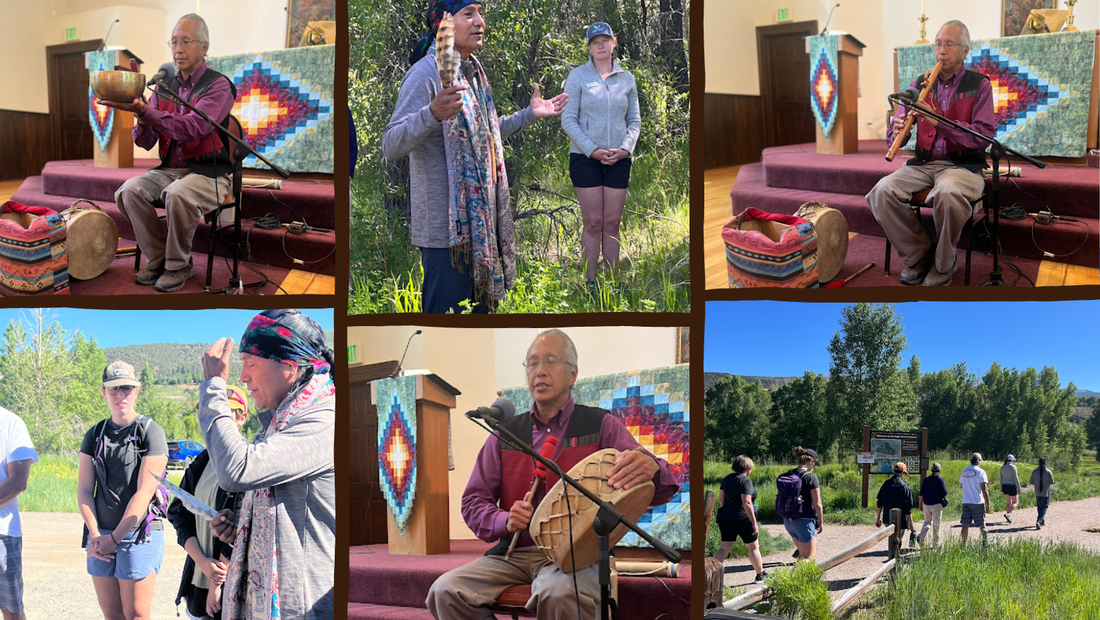PRESS & MEDIA |
PRESS & MEDIA |
|
Pictured above: Tomatoes, melons, squash, corn and more are peeking through the soil at homes across Pine Ridge! In early June, a crew of volunteers and Lakota community members worked together to install and plant garden boxes at over a dozen homes across the Pine Ridge reservation. A month and half later, these small but mighty seedlings are continuing to grow strong! Gardeners on Pine Ridge are up against a unique set of challenges; horses and dogs are prone to disturbing the seedlings, water access is limited or altogether unavailable in some homes, and families have had to mitigate the effects of hail and an unusually wet summer on their plants. The Pine Ridge families and youth with whom we work are engaging with these challenges in a spirit of curiosity and learning. The hard work of these gardeners, many of them first-timers, is beautiful to witness! Gratitude to volunteers Jane and Deanna (pictured below) for making the journey to Pine Ridge earlier this month and checking in with families and their gardens. This project is being conducted in partnership with our friends at Common Name Farm - we're so grateful to them for these seedlings and for exchanging plant knowledge with Pine Ridge gardeners! Stay tuned throughout the growing season for more garden updates.
0 Comments
In this edition of the Reconciliation through Education blog, learn about the Supreme Court’s recent ruling on the Indian Child Welfare Act and explore related resources from Native voices. Pictured: Kimberly Jump-CrazyBear, (Osage & Oglala), demonstrates in support of ICWA at the Supreme Court, November 2022. Image credits to Jourdan Bennett-Begaye/Indian Country Today and The Signal. On June 15th, 2023, the Supreme Court upheld the Indian Child Welfare Act (ICWA), a federal law considered the “gold standard” of child welfare policy. The act, which gives tribes exclusive jurisdiction over cases involving the custody of Indigenous children, was called into question when a non-Native family brought forth a lawsuit challenging it on several grounds. Passed by Congress in 1978 in an effort to help keep Native children with their families and communities and protect them against forced removal from their cultures, ICWA guarantees a tribal voice in determining the placement of Native children into foster or adoptive homes. In the decades prior to its passage, over one-third of Native children had been removed from their families, with most placed permanently into non-Native households. Often, the children were removed from intact families on the grounds of perceived poverty rather than any suspicion of neglect or abuse. These family separation efforts formed part of the US government’s Indian Termination & Relocation policy, a doctrine that underpinned federal relations with tribes in the mid 20th-century. But in the wake of the American Indian Movement, efforts by grassroots organizers and tribal leaders had begun to shift this policy, with the passage of the Indian Child Welfare Act and other federal laws signaling the US Government’s mounting focus on tribal sovereignty and self-determination. Pictured: A fancy shawl dancer celebrates the Supreme Court's decision to uphold ICWA, June 2023. Image credits to ABC News. In 2018, Texas parents Dr. Jennifer and Chad Brackeen set forth a challenge to the Indian Child Welfare Act. The couple, who are non-Native, wished to obtain custody of two Diné (Navajo) siblings after forming a bond with the elder sibling as their foster child - but under the terms of ICWA, placement with a Native family member or, in the absence of a willing and able family member, a non-relative Native family within the child’s tribe, is prioritized. The Brackeen’s case contended that ICWA is unconstitutional, arguing that its provisions violate the Equal Protection Clause, and that its terms undermine state jurisdiction in cases relating to family law. Other non-Native couples who had attempted to adopt Indigenous children joined the litigation, which rose to the attention of federal courts in 2022. Arguments in support of their collective case were heard by the Supreme Court last November - ultimately, the Court did not side with the Brackeens et. al, with 7 out of 9 justices ruling in favor of the constitutionality of ICWA last month. In a majority opinion authored by Justice Amy Coney Barrett, the Court asserted the right of Congress to create legislation regarding tribal affairs and child welfare, but did not address claims that ICWA violates the Equal Protection Clause. While the Indian Child Welfare Act has been upheld on a federal level, threats to its fulfillment in individual states and municipalities persist - only 14 state legislatures have written ICWA’s provisions into their own laws. Dive deeper into this topic at the resources linked below. Resource Links On ICWA and the history behind its passage: A summary of ICWA from the National Indian Child Welfare Association: https://www.nicwa.org/about-icwa/ "Dawnland," a 2018 documentary chronicling the removal of Native children from their homes on the Wabanaki Nation in Maine throughout the 20th century, and the Truth and Reconciliation Commission aiming to heal the wounds of this tragic history: https://dawnland.org/ "ICWA History and Purpose" from the Montana Department of Health & Human Services: https://dphhs.mt.gov/cfsd/icwa/icwahistory "The Brutal Past and Uncertain Future of Native Adoptions" from the New York Times: https://www.nytimes.com/2023/05/16/nyregion/indian-child-welfare-act-supreme-court.html: On Haaland v. Brackeen, the Supreme Court Case that nearly overturned ICWA, and the Supreme Court ruling in favor of ICWA: "Who Can Adopt a Native American Child? A Texas Couple vs. 573 Tribes" from the New York Times: https://www.nytimes.com/2019/06/05/health/navajo-children-custody-fight.html Full text of the Supreme Court's Majority Opinion on Haaland v. Brackeen: https://www.supremecourt.gov/opinions/22pdf/21-376_7l48.pdf "Win for tribes as high court upholds ICWA" from the Cherokee Phoenix: https://www.cherokeephoenix.org/news/win-for-tribes-as-high-court-upholds-icwa/article_86ac1e80-0bb0-11ee-b315-7ffd756ebbf1.html Actions to take in support of protections for Native children: Urge your local representatives to support the implementation of ICWA in your state: https://action.aclu.org/send-message/protect-native-families Additional educational resources to explore from Native voices on this topic, compiled by the Protect ICWA Campaign: https://linktr.ee/protecticwa Sources for this newsletter include: Coverage of this topic from Native News Online, ABC News, the New York Times, the National Indian Child Welfare Association, and NPR.
The Indigenous Wisdom Gathering & 4 Directions Ride, our annual signature event, concluded last week. Continue reading for a recap of the final two days of the event!  So often, we walk this world unconsciously, not pausing to ground ourselves on the earth beneath our feet. But Indigenous teachings from various tribes invite us to once again tap into our innate connection with Unci Maka/Mother Earth - and last weekend, wisdom keepers Joseph Medicine Robe & Darryl Slim inspired us to recall that knowledge on the final two days of the 2023 Indigenous Wisdom Gathering. On Sunday, June 25th, a flute's gentle melody reverberated through the air of the quiet mountain town of Gypsum, CO - its player, Joseph Medicine Robe, held space as the community of First Lutheran Church of Gypsum reflected on the Lakota spiritual teachings he shared with them. Through drumming, singing, and flute-playing, Joseph keeps the ways of his ancestors alive, and helps bring age-old wisdom into the context of the modern world. “It’s the ancestors coming through this voice. The teachings come through, and the tears sometimes flow," he shared of his work to carry the torch for these traditional ways. Over the course of a powerful two-hour presentation at First Lutheran, Joseph's songs and words grounded attendees in a sense of place and appreciation for the Indigenous lands on which the event took place, and the connectedness we share when we coexist with all living beings: “I thank you for being here, not just here in this building, or here in Gypsum, but here on this earth. Here we are - together - on Mother Earth.” Hear a prayer song shared on flute by Joseph during his presentation in the video linked HERE, and check out this Vail Daily article highlighting other special moments that took place throughout his talk! Teachings around the sacredness of Mother Earth continued into Monday's events, with Tipi Raisers' Spiritual and Cultural Advisor Darryl Slim leading a nature walk in Edwards, CO in partnership with Eagle Valley Land Trust. Darryl's lives in the way of Hózhó, as taught to him by his grandparents during his childhood on the Diné (Navajo) Nation. In his words, “Hózhó means you’re in a place of beauty, joy, love and peace. When you’re living in Hózhó, that’s when healing begins.” Guided by this wisdom, Darryl led attendees of the event through a mindful walk along Eagle River. He emphasized the importance of being present and aware with each step, reminding the group to “be where you’re at at all times. Don’t be at your destination.” While hiking in the Western sense can sometimes become a matter of speed, mileage, or finding the perfect view, Darryl's Indigenous teachings invited the community to see each step as a point of grounding, healing and connection between humans and the Earth: “This beautiful, sacred Grandmother (Earth) heals you from your feet up. When you massage Grandma, she massages you back." Read more about Monday's nature walk with Darryl in this story from Vail Daily! We are so thankful to all who made this event possible!
|
AuthorWrite something about yourself. No need to be fancy, just an overview. Archives
July 2024
Categories |
